Politics
Israel attacks Iran in series of pre-dawn airstrikes targeting military infrastructure
Published
3 months agoon
By
Ekwutos Blog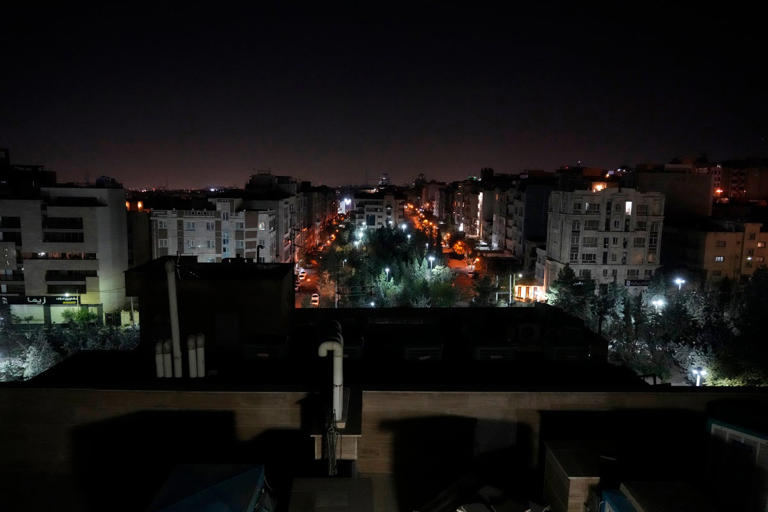
Israel attacked Iran with a series of pre-dawn airstrikes Saturday in what it said was a response to the barrage of ballistic missiles the Islamic Republic fired upon Israel earlier in the month.
The Israeli military said its aircraft targeted facilities that Iran used to make missiles fired at Israel as well as surface-to-air missile sites. There was no immediate indication that oil or missile sites were hit — strikes that would have marked a much more serious escalation — and Israel offered no immediate damage assessment.
Explosions could be heard in the Iranian capital, Tehran, though the Islamic Republic insisted they caused only “limited damage” and Iranian state-run media downplayed the attacks.
Still, the strikes risk pushing the archenemies closer to all-out war at a time of spiraling violence across the Middle East, where militant groups backed by Iran — including Hamas in Gaza and Hezbollah in Lebanon — are already at war with Israel.
“Iran attacked Israel twice, including in locations that endangered civilians, and has paid the price for it,” said Israeli military spokesperson Rear Adm. Daniel Hagari in a video statement.
“We are focused on our war objectives in the Gaza Strip and Lebanon. It is Iran that continues to push for a wider regional escalation.”
Photos and video released by Israel showed Prime Minister Benjamin Netanyahu, wearing a casual black jacket, and Defense Minister Yoav Gallant meeting with military advisors and others in a conference room at a military command and control center in the Kirya military base in Tel Aviv.
The strikes filled the air for hours until sunrise in Iran. They marked the first time Israel’s military has openly attacked Iran, which hasn’t faced a sustained barrage of fire from a foreign enemy since its 1980s war with Iraq.
It came as part of Israel’s “duty to respond” to attacks on it from “Iran and its proxies in the region,” Hagari said.
“The Israel Defense Forces has fulfilled its mission,” Hagari said. “If the regime in Iran were to make the mistake of beginning a new round of escalation, we will be obligated to respond.”
The United States warned against further retaliation, indicating that the overnight strikes should end the direct exchange of fire between the Israel and Iran.
Nuclear facilities and oil installations were all seen as possible targets for Israel’s response to Iran’s Oct. 1 attack, before U.S. President Joe Biden’s administration won assurances from Israel in mid-October that it would not hit such targets, which would be a more severe escalation.
Iran’s military said the strikes targeted military bases in Ilam, Khuzestan and Tehran provinces, without elaborating.
Iran’s state-run media acknowledged blasts that could be heard in Tehran and said some of the sounds came from air defense systems around the city. But beyond a brief reference, Iranian state television for hours offered no other details.
Iran’s move to quickly downplay the attack may offer an avenue for it not to respond, averting further escalation.
Iran fired a wave of missiles and drones at Israel in April after two Iranian generals were killed in an apparent Israeli airstrike in Syria on an Iranian diplomatic post. The missiles and drones caused minimum damage, and Israel — under pressure from Western countries to show restraint — responded with a limited strike it didn’t openly claim.
Dozens were killed and thousands wounded in September when pagers and walkie-talkies used by Hezbollah exploded in two days of attacks attributed to Israel. A massive Israel airstrike the following week outside Beirut killed Hezbollah’s longtime leader, Hassan Nasrallah, and several of his top commanders.
On Oct. 1, Iran launched at least 180 missiles into Israel in retaliation, sending Israelis scrambling into bomb shelters but causing only minimal damage and a few injuries.
Netanyahu immediately said Iran had “made a big mistake.”
Israel then ratcheted up the pressure on Hezbollah by launching a ground invasion into southern Lebanon. More than a million Lebanese people have been displaced, and the death toll has risen sharply as airstrikes hit in and around Beirut.
Israel and Iran have been bitter foes since the 1979 Islamic Revolution. Israel considers Iran to be its greatest threat, citing its leaders’ calls for Israel’s destruction, their support for anti-Israel militant groups and the country’s nuclear program.
During their yearslong shadow war, a suspected Israeli assassination campaign has killed top Iranian nuclear scientists and Iranian nuclear installations have been hacked or sabotaged, all in mysterious attacks blamed on Israel.
Meanwhile, Iran has been blamed for a series of attacks on shipping in the Middle East in recent years, which later grew into the attacks by Yemen’s Houthi rebels on shipping through the Red Sea corridor.
The shadow war has increasingly moved into the light since Oct. 7, 2023, when Hamas and other militants attacked Israel. They killed 1,200 people, mostly civilians, and took some 250 hostages into Gaza. In response, Israel launched a devastating air and ground offensive against Hamas, and Netanyahu has vowed to keep fighting until all of the hostages are freed. Some 100 remain and roughly a third are believed to be dead.
More than 42,000 Palestinians have been killed in Gaza, according to local health officials, who don’t differentiate between civilians and combatants but say more than half of the dead have been women and children.
___
Gambrell reported from Dubai, United Arab Emirates. Associated Press writers Amir Vahdat in Tehran, Iran; Abby Sewell in Beirut; Lolita C. Baldor, Farnoush Amiri and Zeke Miller in Washington; Adam Schreck in Jerusalem; David Rising in Bangkok; and Aamer Madhani in Wilmington, Delaware, contributed to this report.
From news to politics, travel to sport, culture to climate – The Independent has a host of free newsletters to suit your interests. To find the stories you want to read, and more, in your inbox, click here.
You may like


Niger Explosion: Governance must prioritize human lives through proactive policies – Peter Obi


What Speed Darlington posted on Instagram after release from prolonged detention
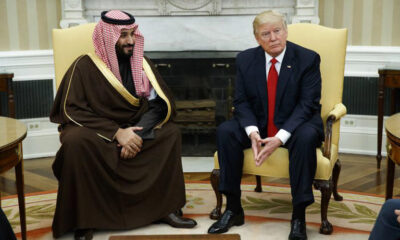

Saudi crown prince says kingdom intends to invest billions in US during call with Trump


The 10 most valuable left-backs in world football in 2025: Calafiori, Gvardiol, Balde…


Abia Govt Begins Major Crackdown On Street Trading, Road Obstructions In Aba


Globacom CEO Ahmad Farroukh resigns after one month amid governance challenges
Politics
Niger Explosion: Governance must prioritize human lives through proactive policies – Peter Obi
Published
2 hours agoon
January 23, 2025By
Ekwutos Blog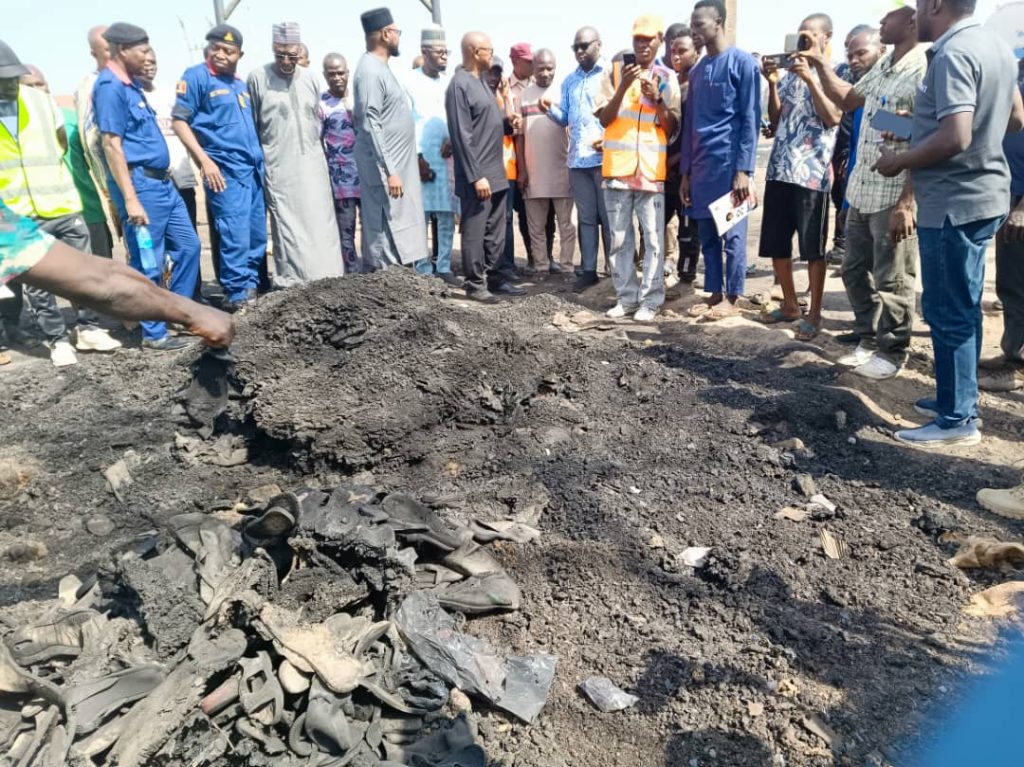
Peter Obi, former governor and 2023 presidential candidate, has called for urgent safety measures to prevent recurring disasters like the tragic petrol tanker explosion that claimed over 100 lives in Suleja, Niger State.
Obi made this appeal during his visit to the site of the explosion, the gravesite, and the Sarkin Dikko palace along the Dikko-Maje Road.
“Today, emotion took the greater part of me as I left Lagos this morning and headed to the site of the tragic petrol tanker explosion, the gravesite, and also the Sarkin Dikko place along the Dikko-Maje Road in Suleja, Niger State, where over 100 lives were lost, more than 50 injured, and many properties destroyed,” Obi shared on his official X handle on Wednesday.
At the explosion site and the graveyard, where 80 victims were buried, Obi expressed sorrow over the preventable tragedy.
He also visited some of the injured victims at the hospital, offering them support and encouragement.
“These recurring disasters call for urgent safety measures: repairing roads, more enlightenment of tanker vehicle operators, investing in healthcare, and lifting people out of poverty to prevent such heartbreaking losses,” he added.
Obi extended his condolences and solidarity to the Dikko community during his meeting with Sarkin Dikko and his council.
He revealed the importance of proactive governance to safeguard human lives.
“Human lives are invaluable, and governance must prioritize their protection through proactive policies,” he stated.
“Together, we can ensure such tragedies become a thing of the past,” he said.
Politics
Saudi crown prince says kingdom intends to invest billions in US during call with Trump
Published
3 hours agoon
January 23, 2025By
Ekwutos Blog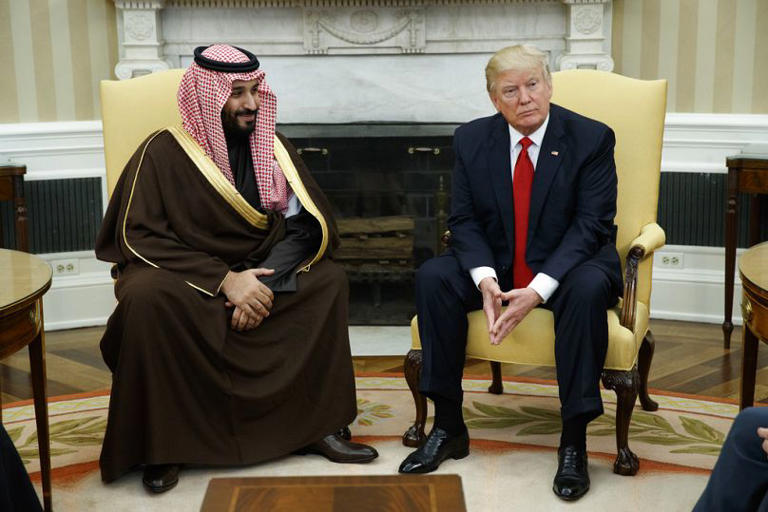
Saudi Arabia’s crown prince said on Thursday that the kingdom wants to invest $600 billion (€576 billion) in the United States over the next four years after a phone call with US President Donald Trump.
Crown Prince Mohammed bin Salman’s comments come after Trump mused about returning to Saudi Arabia as his first foreign trip back in office.
State-run Saudi Press Agency said, “the crown prince affirmed the kingdom’s intention to broaden its investments and trade with the United States over the next four years, in the amount of $600 billion (€576 bn), and potentially beyond that.”
The agency did not elaborate on exactly how the money would be spent.
During their conversation, the two also reportedly discussed ways the two countries could cooperate to establish peace, security and stability in the Middle East.
There was no immediate response from the White House regarding the call. It also wasn’t clear whether Trump’s call with the crown prince was his first with a foreign leader since returning to the Oval Office.
However, it was his first reported abroad.
Trump’s relationship with Saudi Arabia
After his inauguration, Trump talked about the possibility of heading to the kingdom again as his first foreign trip, like he did in 2017.
“The first foreign trip typically has been with the UK but… I did it with Saudi Arabia last time because they agreed to buy $450 billion (€429 bn) worth of our products,” Trump told journalists in the Oval Office.
“I think I’d probably go (again),” the recently inaugurated leader said.
In recent years, the US has increasingly pulled away from relying on Saudi oil exports — once the bedrock the relationship between the two nations.
Trump maintained close relations with Saudi Arabia, even after the crown prince was embroiled in controversy after he was implicated in the 2018 murder of Washington Post columnist Jamal Khashoggi in Istanbul.
The billion dollar pledge, which dwarves the gross domestic product of many nations, comes as the kingdom faces budgetary pressures of its own. Global oil prices remain depressed years after the height of the coronavirus pandemic, affecting the kingdom’s revenues.
Meanwhile, the crown prince has continued to invest in NEOM, a new city in the Saudi Arabian desert. The country also needs to build tens of billions of dollar’s worth of new stadiums and infrastructure ahead of the 2034 FIFA World Cup, which it is hosting.
Politics
Zelensky dampens hopes Trump could strike peace deal with Putin
Published
22 hours agoon
January 22, 2025By
Ekwutos Blog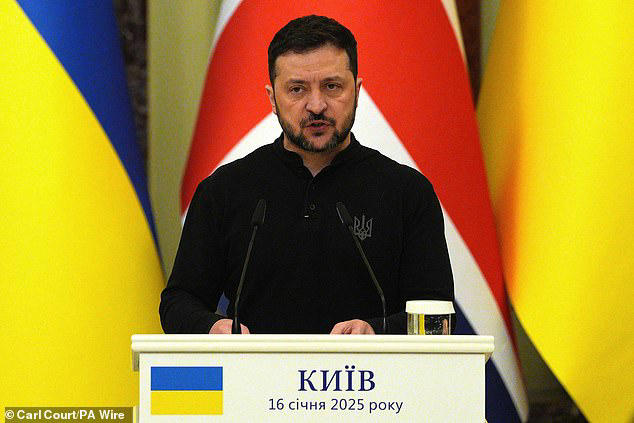
Volodymyr Zelensky has insisted that Ukraine will never recognise occupied Ukrainian territories as being part of Russia, even if pressured to do so by allies, dampening hopes that Donald Trump may be able to strike a peace deal.
‘No matter what anyone wants, even if all the allies in the world unite, we will never recognise the occupied territories [as part of Russia]. This is impossible,’ the Ukrainian president emphasised.
‘We will not legally recognise them. For us, they will always remain occupied territories until we liberate them.’
Trump, who took office for a second term on Monday and was last in power before Russia launched its full-scale invasion of Ukraine, has repeatedly said he could end the war swiftly, without specifying how.
His newly-appointed Secretary of State Marco Rubio said on Tuesday that ending the war was a priority for the president, but would only be possible if both sides make significant concessions.
‘Anytime you bring an end to a conflict between two sides, neither of whom can achieve their maximum goals, each side is going to have to give up something,’ he told CNN, adding that ultimately the decision would be down to the Ukrainians and Russians.
It comes after Russian Deputy Foreign Minister Sergei Ryabkov said today that Moscow sees a small window of opportunity to forge agreements with the new US administration.
‘We cannot say anything today about the degree of the incoming administration’s capacity to negotiate, but still, compared to the hopelessness in every aspect of the previous White House chief (Joe Biden), there is a window of opportunity today, albeit a small one,’ Ryabkov said, according to Interfax.
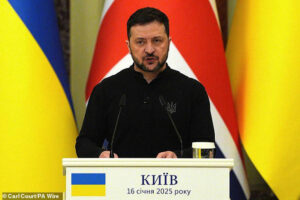
Volodymyr Zelensky has insisted that Ukraine will never recognise occupied Ukrainian territories as being part of Russia
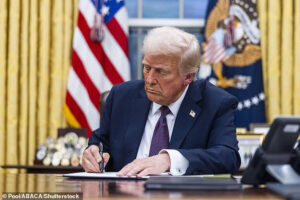
Donald Trump, who took office for a second term on Monday, has said he could end the war swiftly, without specifying how
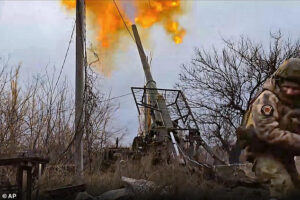
A Russian soldier fires a self-propelled gun
‘It’s therefore important to understand with what and whom we will have to deal, how best to build relations with Washington, how best to maximise opportunities and minimise risks,’ he said, speaking at the Institute for US and Canadian Studies, a think-tank in Moscow.
Trump warned on Tuesday that he would likely impose more sanctions on Russia if President Vladimir Putin refused to negotiate to end the nearly three-year-old conflict.
He gave no details on the possible additional sanctions on Russia, which is already under significant Western sanctions over the war.
The new president also issued a blow to the Kremlin on Tuesday, accusing Putin of ‘destroying Russia‘ with his failed war as he urged him to ‘make a deal’ to end the conflict.
‘He has to make a deal. I think he is destroying Russia by not making a deal,’ Trump said in a stark warning to the dictator.
‘I think Russia is going to be in big trouble,’ he added, saying that Putin ‘can’t be thrilled that he’s not doing so well.’
‘I mean, he works hard, but most people thought the war would be over in about a week, and now it’s been three years, right?’
The Russian economy was sinking, he went on, with inflation a major threat.
Putin, 72, earlier said he was ready to engage with Trump but still insisted on an outcome favouring Russia.
‘We are open to dialogue with the new US administration on the Ukrainian conflict. The most important thing here is to eliminate the root causes of the crisis,’ said the Russian ruler. An initial phone call is expected by Moscow to take place soon.
Trump said Zelensky was ready for a deal to halt the debilitating conflict, and the 78-year-old US leader said he planned to meet Putin with whom he had a ‘great relationship’ during his first term.
‘We’re going to try to do it as quickly as possible. You know, the war between Russia and Ukraine should never have started.’
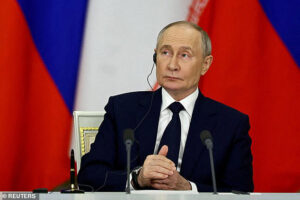
Trump warned on Tuesday that he would likely impose more sanctions on Russia if President Vladimir Putin refused to negotiate to end the nearly three-year-old conflict
After months of Ukraine occupying parts of Russia’s Kursk region as it aims to improve its position in the event of talks, Zelensky stated that any dialogue could only go ahead with Kyiv in a position of strength.
‘Putin cannot be treated as legitimate in this situation. He has violated everything. He must understand his transgression,’ the Ukrainian president said today, adding that if Putin was ‘approached as an equal – that would be a loss for Ukraine.’
But, he said, his government’s top priority was to find a way to halt the war, which has claimed the lives of at least 43,000 Ukrainian soldiers, according to figures released by Ukraine in December.
‘We must find all possible ways to end the hot phase of the war. This is the number one issue,’ Zelensky said.
‘There can be many talks, but the main goal is to stop the active phase. This is the first guarantee of security.’
Russia has occupied Crimea since its 2014 invasion of the territory. Months later it took large parts of the Donbas region, launching a was under the guise of a separatist uprising.
Since the full-scale invasion in 2022, Russian forces have controlled large swathes of southern and eastern Ukraine.
Meanwhile, since a surprise attack in August, Kyiv’s forces occupy around 600 sq km of Russian territory.

Niger Explosion: Governance must prioritize human lives through proactive policies – Peter Obi

What Speed Darlington posted on Instagram after release from prolonged detention

Saudi crown prince says kingdom intends to invest billions in US during call with Trump
Trending
- Politics11 months ago
Nigerian Senate passes Bill seeking the establishment of the South East Development Commission.

 Business11 months ago
Business11 months agoInflation hits record high of 29.90% on naira weakness

 Politics8 months ago
Politics8 months agoBREAKING: Federal Gov’t Offers To Pay Above N60,000, Reaches Agreement With Labour

 SportsNews11 months ago
SportsNews11 months agoOlympic Qualifiers 2024: CAF Confirms Dates For Super Falcons Vs Banyana Banyana

 Trending3 months ago
Trending3 months agoNYA demands release of ‘abducted’ Imo chairman, preaches good governance
- Business3 months ago
US court acquits Air Peace boss, slams Mayfield $4000 fine

 Politics11 months ago
Politics11 months agoGovernor Hope Uzodinma’s New Cabinet In Imo: The Gainers, The Losers

 Politics3 months ago
Politics3 months agoMexico’s new president causes concern just weeks before the US elections

